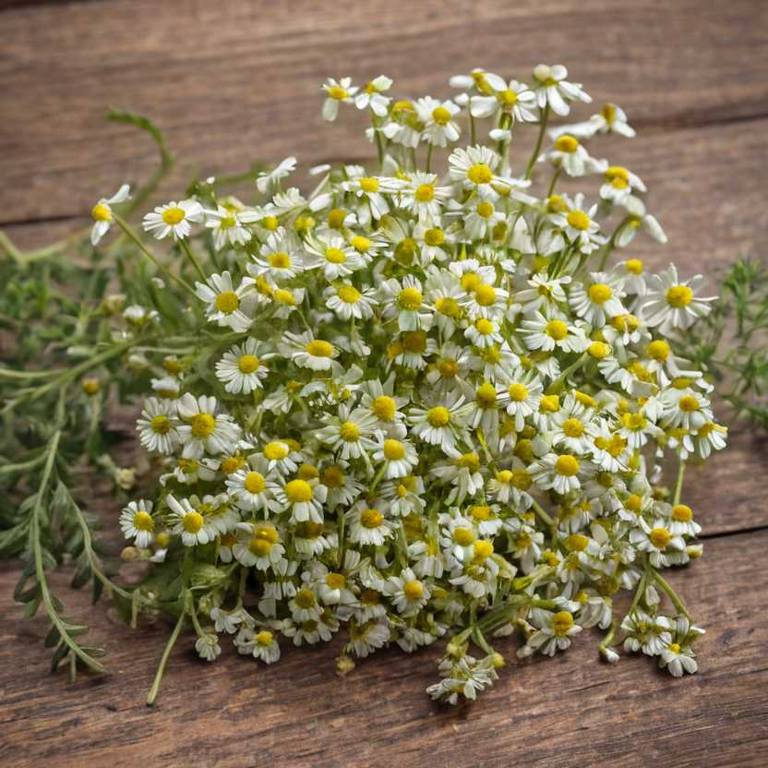10 Best Tanacetum Parthenium Health Benefits

Tanacetum parthenium, commonly known as feverfew, offers a variety of health benefits due to its active compounds such as parthenin and sesquiterpene lactones.
It is widely recognized for its ability to alleviate symptoms of migraines, with studies suggesting it may reduce the frequency and severity of migraine attacks. Additionally, feverfew has anti-inflammatory and antispasmodic properties that can help in managing conditions like arthritis and muscle spasms. The plant is also used to support digestive health by reducing inflammation in the gastrointestinal tract.
Furthermore, it has shown potential in reducing anxiety and stress, making it a valuable herbal remedy for overall well-being.
1. Reduces inflammation
Tanacetum parthenium reduces inflammation by containing compounds such as sesquiterpene lactones, which have potent anti-inflammatory properties.
These compounds work by inhibiting the production of pro-inflammatory cytokines and reducing oxidative stress in the body. It has been traditionally used to treat inflammatory conditions such as arthritis and skin disorders. Studies suggest that it may help alleviate symptoms associated with inflammatory diseases by modulating the immune response.
Its natural anti-inflammatory effects make it a valuable complementary therapy in managing chronic inflammation.
2. Improves digestion
Tanacetum parthenium improves digestion by stimulating the production of digestive enzymes in the stomach and intestines, which helps break down food more efficiently.
It also has mild carminative properties that can reduce gas and bloating, making it beneficial for those experiencing digestive discomfort. The herb's anti-inflammatory effects may help soothe the gastrointestinal tract, promoting smoother digestion. Additionally, Tanacetum parthenium can regulate bowel movements, aiding in both constipation and diarrhea.
Overall, it supports a healthy digestive system by enhancing nutrient absorption and reducing common digestive issues.
3. Relieves anxiety
Tanacetum parthenium relieves anxiety by influencing the central nervous system and promoting a calming effect on the mind and body.
This herb contains bioactive compounds such as sesquiterpene lactones and flavonoids, which may contribute to its anxiolytic properties. Clinical studies have shown that Tanacetum parthenium can help reduce symptoms of generalized anxiety disorder when used as a complementary therapy. Its calming effects are often associated with improved sleep and reduced stress levels in individuals experiencing chronic anxiety.
As a natural remedy, it offers a safer alternative for those seeking relief from anxiety without the side effects of conventional pharmaceuticals.
4. Boosts immunity
Tanacetum parthenium boosts immunity by stimulating the production of white blood cells, which are essential for fighting off infections and diseases.
This herb contains bioactive compounds like parthenin and sesquiterpene lactones that enhance the body's immune response. Regular consumption of Tanacetum parthenium may help reduce the frequency and severity of illnesses. It also supports the activity of the immune system through its anti-inflammatory and antioxidant properties.
As a result, it is often used as a natural remedy to strengthen the body's defenses against pathogens.
5. Reduces fever
Tanacetum parthenium reduces fever by exerting antipyretic effects through its active compounds, such as parthenin and sesquiterpene lactones.
These compounds help regulate body temperature by influencing the hypothalamus, which controls thermoregulation. Traditionally used in herbal medicine, Tanacetum parthenium has been employed to alleviate symptoms of fever associated with colds and infections. Its ability to lower fever makes it a valuable remedy in natural health practices.
However, it is important to consult a healthcare professional before using it, especially for prolonged or high fever cases.
6. Lowers cholesterol
Tanacetum parthenium lowers cholesterol by helping to reduce low-density lipoprotein (LDL), often referred to as "bad" cholesterol, in the bloodstream.
This herb contains compounds like sesquiterpene lactones and flavonoids that may contribute to its cholesterol-lowering effects. Studies suggest that regular consumption of Tanacetum parthenium can improve lipid profiles and support cardiovascular health. Its natural properties make it a potential complementary therapy for managing cholesterol levels.
However, it is important to consult a healthcare professional before using it as part of a cholesterol management plan.
7. Eases insomnia
Tanacetum parthenium eases insomnia by promoting relaxation and reducing anxiety, which are common contributors to sleep difficulties.
The herb contains compounds like sesquiterpene lactones and flavonoids that may interact with the central nervous system to calm the mind and body. Clinical studies have shown that it can improve sleep quality and duration in individuals suffering from mild insomnia. It is often used as a natural alternative to sedatives, offering a safer option with fewer side effects.
Regular use of Tanacetum parthenium may help establish a more consistent and restful sleep pattern.
8. Supports skin health
Tanacetum parthenium supports skin health by providing natural anti-inflammatory and antimicrobial properties that help reduce redness, irritation, and infections.
It contains compounds like sesquiterpene lactones, which have been shown to soothe conditions such as eczema and psoriasis. This herb is also rich in antioxidants that protect the skin from oxidative stress and environmental damage. Its ability to regulate sebum production makes it beneficial for treating acne-prone skin.
Overall, Tanacetum parthenium is a versatile natural remedy that promotes overall skin wellness and healing.
9. Aids respiratory health
Tanacetum parthenium aids respiratory health by reducing inflammation in the airways and alleviating symptoms of conditions like asthma and bronchitis.
Its active compounds, such as parthenin and sesquiterpene lactones, possess anti-inflammatory and bronchodilatory properties that help ease breathing. This herb has been traditionally used to relieve coughing, congestion, and other respiratory discomforts. Studies suggest that it may also help reduce mucus production and improve lung function.
As a result, Tanacetum parthenium is often considered a natural remedy for supporting healthy respiratory function.
10. Promotes detoxification
Tanacetum parthenium promotes detoxification by supporting the liver's ability to process and eliminate toxins from the body.
It contains bioactive compounds such as sesquiterpene lactones, which may enhance the body's natural detoxification processes. These compounds help stimulate the production of enzymes involved in phase I and phase II detoxification pathways. As a result, Tanacetum parthenium may aid in the removal of harmful substances, including environmental toxins and metabolic byproducts.
This makes it a valuable natural supplement for maintaining overall health and supporting the body's cleansing systems.